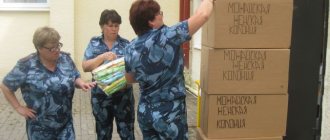Modern criminal legislation in Russia presupposes a developed network of penitentiary institutions of various types. They differ from each other in the conditions of detention of convicts, which is regulated by Article 58 of the Criminal Code. Staying in a colony-settlement is prescribed in the provisions of Article 128 of the Criminal Executive Code of the Russian Federation.
Let us consider in more detail in this article the specifics of staying in these correctional institutions, how it differs from staying in regular or maximum security prisons, what are the rules of the daily routine, work, study and other nuances.
What it is?
A colony-settlement is a correctional institution in which citizens who have committed a crime through negligence for the first time, or who have intentionally violated the law, but within the limits of a minor or moderate crime, are serving their sentences.
Unlike general, strict and special regime colonies, a “settlement” type institution provides for easier living and serving conditions:
- possibility of living in dormitories;
- freedom of movement is limited only to the territory of the colony and, in some cases, there is permission to leave the colony, but without leaving the boundaries of the given locality;
- preservation of a large number of civil rights;
- the possibility of convicts of both sexes living together.
The main goal of these correctional institutions is to correct the behavior and life attitudes of a novice criminal. This is achieved through the influence of a set of specially designed educational measures that the correctional system has on the convicted person. This includes compulsory labor, cultural and educational activities carried out by colony workers, and personal conversations with citizens who have stumbled.
We talked in more detail about what a colony-settlement is and how prisoners live there in this material.
Severe punishment or holiday camp?
Sentence to a penal colony is a relatively mild form of punishment available in Russian legislation. However, living conditions very much depend on the policies of a particular administration.
As a rule, prison inmates strive to be transferred to a colony-settlement, but it also happens that in some colonies such unbearable living conditions have been created that settlers are willing to deliberately violate the rules of the colony and even commit crimes in order to be transferred to other correctional institutions.
Photos of colony settlements
Photos were kindly borrowed from the official pages of the Federal Penitentiary Service: FKU KP-12 Federal Penitentiary Service of Russia for the Ivanovo Region, Federal State Institution “KP-6 Federal Penitentiary Service of Russia for the Kaluga Region”.
What violations can you get here for?
Let's look at what gives the opportunity to serve a sentence in penal colonies. Convicts may be transferred to correctional institutions of this type:
- males who have committed a crime through negligence or an intentional crime of minor and medium gravity, who have been brought to criminal liability in the form of imprisonment for the first time, as well as females for crimes of medium gravity, for the first time or repeatedly;
- prisoners from other correctional colonies who have proven by their behavior that they intend to reform and repent of their actions (at the request of the authorities of the institution where they were previously imprisoned).
In other words, people who live in such colonies do not, in the opinion of law enforcement agencies and criminal legislation, pose a real threat to society, and therefore are not completely isolated from it.
How to find out the information you need
As a rule, the convict gets to the colony-settlement under his own power after receiving a certain order. He is under the control of the criminal inspectorate until he arrives at the place of serving his sentence. Everything here is quite clear.
The address of the colony settlement will be indicated in the order issued to the convicted person. So it's almost impossible to get lost. Moreover, all colony settlements are located in special areas. villages, and public transport goes there. But sometimes it happens that the convicted person does not arrive there at the appointed time to serve his sentence. In this case, he may be put on the wanted list.
Moreover, the court, at the request of the executive inspection, has the right to change the latter’s type of correctional institution and transfer it to a general regime. So there is no need to violate the rules specified in the instructions.
The number of the colony settlement is also indicated in this document issued to the convicted person. He has the right to provide this information to his relatives so that they can come to him on a date or send a parcel.
Conditions of serving
The standards of residence and conditions for serving a term of imprisonment in colony settlements are clearly stated in Article 129 of the Criminal Executive Code of the Russian Federation.
Article 129 of the Penal Code of the Russian Federation. Conditions for serving imprisonment in colony settlements.
- In colony settlements, those sentenced to imprisonment:
- They are kept without security, but under the supervision of the administration of the colony-settlement;
during the hours from getting up to lights out, they have the right to free movement within the colony-settlement; with the permission of the administration of the colony-settlement, they can move without supervision outside the colony-settlement, but within the boundaries of the municipal entity on the territory of which the colony-settlement is located, if this is necessary due to the nature of the work they perform or in connection with training; may wear civilian clothes; may carry money and valuables; use money without restrictions; receive parcels, packages and packages; can have dates without limiting their number. We talk about what things you need to take with you to a colony settlement and how to behave correctly there in a separate article. - They usually live in dormitories specially designed for them.
Convicts who do not commit violations of the established procedure for serving their sentence and who have families, by order of the head of the colony-settlement, may be allowed to live with their families in rented or their own living space located within the boundaries of the colony-settlement or the municipality on the territory of which the colony-settlement is located .
These convicts are required to appear for registration in the colony-settlement up to four times a month. The frequency of registration is established by a resolution of the head of the colony-settlement. The residential premises in which convicts live can be visited at any time by a representative of the administration of the colony settlement.
- They are kept without security, but under the supervision of the administration of the colony-settlement;
- They have a document of the established form identifying the convicted person. The passport and other personal documents of convicted persons are kept in their personal files.
- Convicts are prohibited from using and storing on the territory of the colony-settlement and at facilities where work is carried out, objects and substances, the list of which is established by the Internal Regulations of Correctional Institutions.
- The work of convicts is regulated by the labor legislation of the Russian Federation, with the exception of the rules of hiring, dismissal from work and transfer to another job. The transfer of convicts to another job, including to another locality, can be carried out by the administration of the enterprise where they work, in agreement with the administration of the colony-settlement.
- Convicts are allowed to study by correspondence in educational organizations of higher education and professional educational organizations located within the municipality on the territory of which the colony-settlement is located.
- When a penalty in the form of a ban on leaving the hostel during free time from work for up to 30 days is applied to convicts serving imprisonment in penal colonies and not engaged in socially useful work, they are given the right to a daily walk lasting at least two hours.
Escape attempts: reviews
Convicts say that many alcoholics and drug addicts often escape. However, everything is much simpler than shown in the films. In fact, most often people only run to their home, get drunk and then are found right there.
The worst thing is if before imprisonment the person lived in the region. Accordingly, the search will drag on for several days until he gets home. Also, convicts say that there are those guys who run away to their beloved girl, who begins to ignore them and not call them.
Rights and responsibilities, including restrictions, of colonists
In settlement colonies there are a number of rules that must be observed and followed by convicts. Let's look at them in more detail.
- It is prohibited to leave the territory of the correctional institution unless the authorities are first informed about this or give their consent.
- They may be allowed to leave the colony if it is related to the work or educational activities of the convicted person (that is, the place of work is located outside the territory of the colony, or the form of education is not distance learning, but requires the presence of the student in an educational institution).
- All colonists are required to find employment. This point is strictly monitored by the colony administration. Either colony workers find work for convicts, or prisoners do it themselves. The main requirement is that the place of work must be located in the same locality where the correctional institution is located. Prisoners have the right to dispose of the wages they receive for their work in full, without restrictions, and spend them on their personal needs.
- The main document certifying the identity of a convicted person for the duration of his stay in a colony of this type is a special certificate of the established form.
It must be carefully stored and presented at the request of law enforcement officials instead of a passport. It is also what the colonists provide to their employer when receiving postal orders, letters and parcels, as well as entering into marriages or going through the procedure of their dissolution. The remaining documents are confiscated from prisoners and are kept in the custody of the settlement leadership.
Convicts in a colony settlement are strictly prohibited from:
- to be outside the colony without notifying the administration of this institution or to be detained without a valid reason;
- use alcohol, drugs and other toxic substances, both on the territory of the colony and outside it;
- carry bladed weapons or firearms with you, as well as keep them at home;
- buy any vehicles (of any type, regardless of speed capabilities and price);
- buy medicines and other medical supplies without a prescription from a doctor;
- use mobile communications and own them secretly from the colony authorities;
- prevent the inspection of personal belongings and living quarters in which convicts are housed (colony employees and duty officers have the right to control the contents of dormitory rooms and places where clothes, shoes and other personal items of convicts are stored).
Conditions of detention in colony settlements
What do colony settlements look like? A correctional facility of this type involves living in a dormitory building. It is located, as a rule, within the city, most often in its central part. In appearance, such a structure is practically no different from other examples of standard buildings.
Many residents of the city may not even realize that this is a colony-settlement, since no high fences with barbed wire, connected electricity, specially trained guards and other attributes of institutions of strict and special regime deprivation of liberty are visible here.
The only signs by which one can identify an establishment of this type is a small sign with the inscription “No more than three people allowed in” at the door of the building. There are also window bars, which can be seen on ordinary residential buildings in order to protect against theft or hooligan attacks on property. Only in this dormitory, wrought iron bars are usually placed on all windows, regardless of floors and height.
The rooms usually accommodate about six people. The area of the room may vary, but according to the prescribed standards, at least 4 m2 of living space must be allocated for each prisoner. On average, the total area of a room is 20-24 m2. In total, approximately ninety people can live in the settlement.
Prisoners who have proven themselves on the positive side, have no comments from the colony authorities and take an active part in the cultural, educational and sports life of the institution, are allowed to live in separate rooms for one or two people.
Necessary furniture and equipment in the rooms include:
- a single bed on a metal frame with laminated chipboard walls at the head and feet, with a mattress (the beds can be either single or double tier);
- a nightstand near the bed (one for each prisoner), where there are two drawers and two compartments for storing small items (hygiene products, books, writing instruments, cosmetics, etc.);
- shared wardrobe;
- Desktop;
- chairs (one chair in the room for each resident);
- a food storage cabinet with compartments for each person;
- TV mounted in the wall (depending on the colony and its financial support);
- refrigerator (also not always present);
- mirror;
- radio;
- lamps;
- cleaning equipment (mop, broom, dustpan, bucket).
In some cases, the administration of the colony allows keeping pets in rooms in specially designed equipment: fish in an aquarium, birds, rodents or non-poisonous reptiles in terrariums. You can also plant indoor plants.
It is allowed to bring individual elements to the colony to decorate the interior of the room. The main requirement is that they must be soft and made of fabric. These are various pillows, bedspreads, blankets, tablecloths.
Convicts can monitor their hygiene by performing water procedures in the shower rooms. As a rule, there are several showers on each floor, which can be accessed in the morning and evening on a first-come, first-served basis. Cold and hot water is supplied to the dormitory. In addition, some colonies have their own bathhouse , where prisoners are taken on weekends.
Prisoners are required to be on duty both in the room and in common areas. This applies to maintaining order and cleanliness, monitoring the integrity of furniture and equipment in the dormitory, as well as monitoring the behavior of convicts.
The dress code in the settlement colonies is free. No special form with distinctive features is provided. Personal wardrobe items are not taken away upon admission. The style of clothing, choice of color, style, etc. is a matter of taste and preference of the citizen serving his sentence in a given institution.
To keep the wardrobe clean and tidy, the colony has a laundry service. Inmates can also get their hair cut and styled at a local hair salon.
In case of illness or deterioration of health, convicts have the right to contact the medical unit , which is also necessarily available in the colony. It consists of an outpatient clinic and a hospital, where people are received and served by on-duty health workers.
Schedule
Life in the colony is strictly regulated. An approximate schedule for the day may look like this (temporary discrepancies are possible depending on internal rules and the availability of shifts).
- 6.00 - get up, morning toilet, make beds.
- 6.10 - physical exercises.
- 6.15 - general check.
- 6.20 - breakfast.
- 6.50 - leave for work.
- 7.00 - work.
- 11.30 - lunch.
- 14.50 - I leave work.
- 15.00 - general check.
- 15.20 - divorce for studies or events.
- 16.30 - economic part.
- 18.00 - dinner.
- 18.30 - cultural work.
- 19.40 - personal time.
- 20.40 - evening toilet, getting ready for bed.
- 21.00 - lights out.
Nutrition
There is a canteen on the territory of the settlement, where prisoners are given three meals a day until they have independent funds to purchase food.
Meals consisting of two or three courses are provided. The nutritional value of dishes is based on the average daily caloric intake required to ensure the vital functions of an adult human body. In fact, this food is not much different from hospital food.
Sample menu:
- breakfast: porridge, bread, tea with sugar;
- lunch: soup with cape and vegetables, chicken or cutlet with side dish, bread, compote;
- dinner: vegetable stew or porridge, bread, tea with sugar.
It is prohibited to cook in the rooms in order to comply with fire safety regulations; there are specially designated areas for this.
Find out how prisoners in prisons of various regimes eat here.
Job
Labor activity for those sentenced to settlement is mandatory , regardless of the availability of personal means of subsistence, as it is an element of the correctional program. It does not exceed eight hours.
The wages of convicts cannot be lower than the minimum wage established in the region where the colony is located (Article 105 of the Penal Code of the Russian Federation).
Prisoners living in a colony settlement can work:
- in labor adaptation centers for persons sentenced to imprisonment;
- in production (sewing, shoe, carpentry, etc.) workshops located on the territory of the colony;
- at state enterprises;
- in other organizations located both on the territory of the colony and outside it (at construction sites, in the woodworking sector and any industries where there is a shortage of labor).
Prisoners are sent to work in large groups and under mandatory supervision in order to prevent cases of consumption of alcoholic beverages and other prohibited substances, as well as to prevent unauthorized leaving of the populated area (escape).
Studies
Convicts have the right to receive education by correspondence in educational organizations of higher education and professional educational organizations located within the municipality on the territory of which the colony-settlement is located.
Entertainment and relaxation
Most entertainment events in the colony have an educational connotation. It can be:
- concerts of amateur performances and invited musical performers;
- quizzes;
- games (sports and intellectual);
- beauty contests.
Each colony for such events has an assembly hall with a stage, curtain and plenty of seating.
In addition, each colony provides for the activities of psychologists and social educators. They conduct conversations with convicts, conduct various tests, and contribute to the peaceful resolution of conflict situations between prisoners.
Consultations are also provided for convicted citizens on the topic of their future social adaptation, legal guarantees, and social protection. Issues of obtaining education and mastering a profession are widely covered.
Religious issues
Each colony has special premises for religious purposes , where convicts can pray, confess and read spiritual literature. In addition, all colonies maintain contact with religious organizations operating in the region.
If the prisoner belongs to a religious denomination, elements of the cult of which are not represented in this institution, then, at his personal request, he can be arranged a meeting with a priest serving specifically within the framework of his religion.
Dates and visits
The number of dates and visits to relatives is not limited. In addition, women who are mothers of children under fourteen years of age, and men who have a child of the same age range and are his sole legal representative, have the right to additional visits on weekends and holidays with accommodation outside the correctional facility. The main thing is not to leave the boundaries of the locality or municipality in which the colony is located.
Unlike settlements, in high-security and special-regime prisons, meetings with prisoners are limited and you can find out how short-term visits take place in them in this article, and here we talked about how often and to whom long-term meetings are given.
Transfer of products and things
Residents of colony settlements have the right to receive parcels in unlimited quantities. Things and products are inspected by employees of the institution to identify funds prohibited for transfer (Article 90 of the Penal Code of the Russian Federation).
Allowed to transmit:
- personal items (combs, toothbrushes, hygiene products, underwear);
- warm clothes;
- books and writing materials;
- cigarettes;
- food products (cereals, vegetables, sausages, tea, instant coffee, instant foods, vegetable oil up to 3 liters, canned food, fish, honey, confectionery).
All food products must be carefully packaged in transparent bags. No cans, bottles, etc. (metal, glass are not allowed).
Prohibited:
- perishable or cooking products;
- alcoholic drinks or drugs;
- all types of weapons;
- phones and SIM cards;
- money and valuables;
- watch;
- optical instruments;
- playing cards;
- pornographic materials;
- photographic equipment and office equipment.
Violation of these rules may result in administrative punishment in the form of a fine.
Read about what is allowed to be transferred to prisoners in the zone, prison and pre-trial detention center in a separate material.
What does quarantine mean?
All prisoners entering a colony for the first time must first undergo quarantine for fifteen calendar days (Part 2 of Article 79 of the Criminal Code of the Russian Federation). The conditions for serving the sentence remain normal. In essence, this is just a separate living space for newcomers, but they eat, work and spend time together with everyone else. Quarantine is needed for adaptation.
What are the features of the content for women?
In colonies with easier conditions for women, there may additionally be sewing workshops and other premises where convicts can carry out their work duties. Also for those who have children, there is a mother and child room and a playroom for children. There are no other differences.
We talked about how sentences are served in women's prisons of various regimes here.
Conditions for the transfer of a convicted person from regular and maximum security prisons
In accordance with Part 1 of Article 78 of the Penal Code, a transfer from a general regime colony to a settlement colony is provided for after convicts in light conditions of detention have served at least one quarter of their sentence.
According to Part 2 of Article 78 of the Penal Code of the Russian Federation, convicts from high-security correctional colonies can be sent to a colony-settlement:
- If they have already spent at least one third of their sentence in prison.
- If they were previously released on parole from serving imprisonment, but committed crimes again during the remaining unserved part of the sentence, after serving at least half of the sentence.
- If they are sentenced to imprisonment for committing especially serious crimes - after serving at least two-thirds of the sentence.
Transfer is carried out only if the convicted person is corrected and has positive characteristics. To do this you need:
- do not conflict with fellow inmates and correctional facility employees;
- conscientiously carry out work assignments and other orders of superiors;
- actively participate in the cultural and educational activities of the colony;
- have no complaints from superiors;
- independently express your intention to transfer.
How to make a petition?
A petition to transfer a convicted person to a colony-settlement is drawn up by the prisoner himself or by the head of the correctional institution where the convicted person is currently serving his sentence. It is drawn up according to the established template. The form indicates the reasons for the transfer:
- the term that the prisoner has already served in a general or maximum security correctional institution (we talked about the conditions under which maximum security prisoners serve their sentences here);
- expression of remorse for the crime committed;
- In addition, references from the employer and the colony administration are attached, proving that the person has taken the path of correction;
- available incentives during imprisonment.
The completed petition is sent by the head of the colony to the court for consideration and a decision.
Right to release on parole
Like other prisoners held in places of deprivation of liberty, those sentenced to stay in a colony-settlement have the right to be released early (according to Article 79 of the Criminal Code of the Russian Federation).
How to get out on parole? To do this, the court must recognize that for his correction, a convicted citizen no longer needs imprisonment in the form of a full term of serving. In this case, it must be established that the damage caused by the crime has already been fully or partially compensated. A person may be fully or partially exempted from bearing an additional type of punishment.
Circumstances facilitating parole:
- complete repentance of the convicted person for the unlawful act committed;
- exemplary behavior of the prisoner, strict adherence to the internal regulations and requirements of the colony management;
- support from witnesses to the crime;
- for women - pregnancy or the presence of young children;
- positive characteristics from the administration of the correctional institution.
Moments aggravating the receipt of parole:
- systematic disciplinary violations;
- frequent conflict situations with other prisoners;
- inappropriate, aggressive behavior;
- negative assessment of the convict’s behavior by colony workers.
Quarantine
Once in the colony, the prisoner does not immediately go to the dormitory. First, he must spend up to 15 days in quarantine. The conditions for keeping quarantined prisoners are regulated by Article 79 of the Criminal Code of the Russian Federation.
After arriving at the colony, the convict is sent to the quarantine department. The conditions of stay here correspond to the usual conditions of serving a sentence.
In this case, quarantine is not only a medical term, but also a concept of a criminal procedural nature. It involves performing a number of procedural actions before the convicted person enters a cell or dorm room.
List of procedures
The complex of quarantine procedures is regulated not only by the norms of the Criminal Procedure Code, but also by the internal acts of the correctional institution. Each new arrival must be examined by the doctor on duty or a paramedic. The convict is asked questions regarding his state of health, complaints are listened to, and blood pressure and blood sugar levels are measured.
Next, the prisoner must undergo stool and urine tests and be weighed. The prisoner's head circumference is also measured. All this data is entered into his medical outpatient record. The final stage of the examination is fluorography.
Those patients who complain of specific ailments are referred for examination to a specialized specialist. If there are no complaints, then the person is transferred to a general place of detention.
If a prisoner has been subjected to torture or beatings, he must notify the doctor about this. However, you should insist that this information be included in the medical record. This is especially important if the prisoner plans to challenge the court's decision. By citing bruises and abrasions, he will be able to insist that the testimony was extracted from him by force.
If the convicted person believes that the medical examination was carried out insufficiently or in violation of rights, then he can insist on a re-examination. According to general rules, it should be carried out by employees of other medical organizations. If the administration refuses to meet the citizen halfway, he has every right to appeal to the prosecutor’s office or to court.
Prison doctors and administration staff are suspicious of statements made by prisoners regarding poor health. The fact is that some prisoners pretend to feel much worse than they really are.









